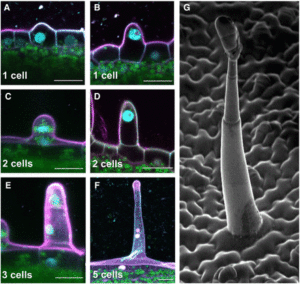Update: Plant Glandular Trichomes: Natural Cell Factories of High Biotechnological Interest
By
Abstract
 Multicellular glandular trichomes are epidermal outgrowths characterized by the presence of a head made of cells that have the ability to secrete or store large quantities of specialized metabolites. Our understanding of the transcriptional control of glandular trichome initiation and development is still in its infancy. This review points to some central questions that need to be addressed to better understand how such specialized cell structures arise from the plant protodermis. A key and unique feature of glandular trichomes is their ability to synthesize and secrete large amounts, relative to their size, of a limited number of metabolites. As such, they qualify as true cell factories, making them interesting targets for metabolic engineering. In this review, recent advances regarding terpene metabolic engineering are highlighted, with a special focus on tobacco (Nicotiana tabacum). In particular, the choice of transcriptional promoters to drive transgene expression and the best ways to sink existing pools of terpene precursors are discussed. The bioavailability of existing pools of natural precursor molecules is a key parameter and is controlled by so-called cross talk between different biosynthetic pathways. As highlighted in this review, the exact nature and extent of such cross talk are only partially understood at present. In the future, awareness of, and detailed knowledge on, the biology of plant glandular trichome development and metabolism will generate new leads to tap the largely unexploited potential of glandular trichomes in plant resistance to pests and lead to the improved production of specialized metabolites with high industrial or pharmacological value.
Multicellular glandular trichomes are epidermal outgrowths characterized by the presence of a head made of cells that have the ability to secrete or store large quantities of specialized metabolites. Our understanding of the transcriptional control of glandular trichome initiation and development is still in its infancy. This review points to some central questions that need to be addressed to better understand how such specialized cell structures arise from the plant protodermis. A key and unique feature of glandular trichomes is their ability to synthesize and secrete large amounts, relative to their size, of a limited number of metabolites. As such, they qualify as true cell factories, making them interesting targets for metabolic engineering. In this review, recent advances regarding terpene metabolic engineering are highlighted, with a special focus on tobacco (Nicotiana tabacum). In particular, the choice of transcriptional promoters to drive transgene expression and the best ways to sink existing pools of terpene precursors are discussed. The bioavailability of existing pools of natural precursor molecules is a key parameter and is controlled by so-called cross talk between different biosynthetic pathways. As highlighted in this review, the exact nature and extent of such cross talk are only partially understood at present. In the future, awareness of, and detailed knowledge on, the biology of plant glandular trichome development and metabolism will generate new leads to tap the largely unexploited potential of glandular trichomes in plant resistance to pests and lead to the improved production of specialized metabolites with high industrial or pharmacological value.



